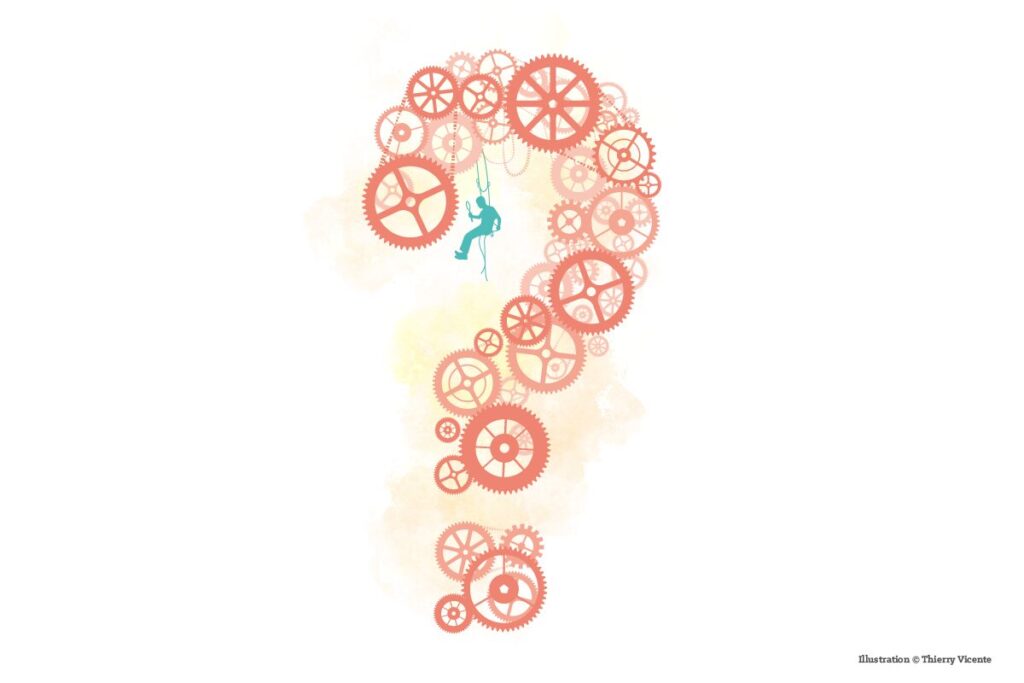[LUM#1] Knowledge under construction
What processes are involved in the construction of knowledge? The epistemology of science sheds light on the issues at the heart of the invention and dissemination of knowledge.

Muriel Guedj is certain: when it comes to research, nothing is certain. "What drives scientific progress on a daily basis? It's doubt, rather than certainty." Doubt, trial and error, hypotheses, testing, mistakes, dead ends... Far from being mere hiccups along the way, these are the very steps in the construction of scientific discourse, the dynamic principles of its genesis, explains this historian of science. "It's a bit the opposite of what we're taught in school, really!" she jokes.
Review the error status
"Discovering an error is one of the crucial moments, a creative moment among all others, in any work of discovery (...)"explained a renowned rebel against what is taught in school: Alexandre Grothendieck, a revolutionary genius who recently passed away. The great mathematician added: "Fearing error and fearing truth are one and the same thing."
Revisiting the status of error: this is one of the requirements of epistemology, the science of sciences that is also a daughter of philosophy. Rich error. Fertile error! Which occasionally opens up unexpected perspectives. There are countless essential discoveries that were the result of reasoning based on inaccurate hypotheses—such as the discovery of penicillin or vaccines—and fruitful theoretical advances, whole sections of which later proved to be erroneous...
Does scientific progress move from truth to truth? Nothing could be less certain. If science cannot advance without venturing down the uncertain path of hypothesis, as Henri Poincaré pointed out, it is at the risk of error that it truly progresses. We might as well accept it: science is not the long, tranquil river crisscrossed by bold explorers that we like to imagine. Rather, it is a constantly active construction site, marked by the unexpected and accidents.
Restoring science's human dimension
Taking a somewhat idealized scientific approach, epistemology invites us to take a more human and distanced view. "We must move away from scientism," summarizes Muriel Guedj. The collective imagination presents a vision of science that is as simplistic as it is unrealistic: a smooth object with all the appearances of absolute truth.
The first concept to be demystified is that of scientific truth: "What we call truth is often a stage, reached at the end of a sometimes chaotic journey. Be careful, scientific truths are still necessary! And when they need to be modified, it is not because they are relative but because they are incomplete." Far from being a given object, science is a collective construction where conjectures, propositions, and demonstrations respond to each other over time.
Knowledge does not spring fully formed from the head of Zeus? That is reassuring: it means that we can make it our own, this mysterious creative process through which discoverers invent new lands... Epistemology thus invites us to engage in a healthy questioning: "exploring the processes of knowledge construction means restoring science's human face. At the same time, it means removing inhibitions among students and young researchers, allowing them to fully engage in this field of expression and appropriate its methods."
Social issues
While epistemology focuses on the modes of knowledge production, it also examines the historical and social context of scientific activity. "The work of a researcher is neither an autonomous nor an individual activity. It is part of a sociocultural context and bears the mark of numerous societal and political issues." An example? There are countless examples. Here is one that is perhaps more spectacular than others: Darwin's theory of evolution, a tumultuous arena of ideological clashes and religious controversies.
Scientific discourse thus forges links with society that are much more subtle and complex than they appear. The role of the epistemologist is therefore to reveal the layers and rough edges that constitute it. Their method: to challenge knowledge, define it, and contextualize it. "Placing a discovery in its context, culture, and history—even if it's a differential equation!—means drawing the contours of this object that is knowledge: the only way to truly understand it," explains Muriel Guedj.
All epistemologists
Work that greatly benefits citizens. The challenge? Enabling everyone to better understand major social debates. There are countless such debates, whether they relate to the environment, climate, new energies, natural resources, biotechnologies, food, etc.
This issue has become particularly vital in the Internet age. While the web provides access to enormous amounts of data, it is this very abundance that paradoxically complicates access to knowledge, making it increasingly difficult to perform the necessary task of separating the wheat from the chaff.
"What is changing is our entire relationship with knowledge, " summarizes the epistemologist. Today, students no longer come to class to acquire knowledge, but to question it, contextualize it, critique it, and distance themselves from it." By revolutionizing not only access to knowledge but also teaching methods, the digital revolution has had an unexpected result: it has turned us all into epistemologists.
Find UM podcasts now available on your favorite platform (Spotify, Deezer, Apple Podcasts, Amazon Music, etc.).